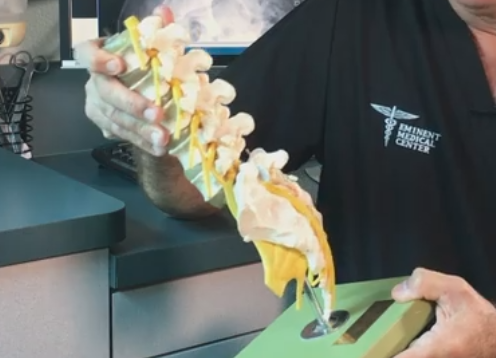What Are the Signs That You May Need a Cervical Disc Doctor?
The cervical spine is in your neck. It is not uncommon to experience problems in this area. When they do occur, it is important to have them promptly evaluated by a cervical disc doctor like Dr. Stephen Courtney. Learning more about this area of the spine, the signs of disc injuries and possible treatments also ensures that you are informed.
The Cervical Spine
There are six discs in the cervical spine. They sit between the vertebrae, providing shock absorption. This makes it possible for the neck to handle the stresses of everyday living and injuries. There are also nerve roots. When a cervical disc is injured or experiences degeneration, it is possible for the nucleus of the disc to essentially leak out and put pressure on the nerve roots. This can cause an array of symptoms.
Cervical Spinal Disc Issues and Symptoms
Injuries to the cervical discs can cause them to herniate or rupture, the same can happen with aging. The discs can degenerate and herniate or rupture. No matter the cause, the symptoms are the same. These may include:
• Neck pain
• Arm or hand weakness
• Arm or shoulder numbness
• Arm or shoulder tingling
The above symptoms are possible when a nerve root is compressed by the damaged disc. Should the spinal cord become compressed, the following symptoms are possible:
• Awkwardness or stumbling while walking
• Issues with the fine motor skills of the arms and hands
• Feeling a shock-like or tingling sensation running down your body
• Loss of coordination and balance
The highest incidence of herniated discs occurs in people 35 to 55 years old. Men tend to experience this issue more than women. However, people of all ages are at risk for herniated cervical discs.
Treating Cervical Spinal Disc Injuries
When you have a problem with the discs in your cervical spine, a few days of rest might be recommended. Your doctor will let you know how long you should expect to rest. They might also prescribe gentle exercises to prevent your neck’s muscles and joints from getting too stiff.
Nonsteroidal anti-inflammatory drugs might be recommended. These help to alleviate pain, as well as the inflammation that can cause swelling. The dosage and administration frequency will be provided by your doctor.
If the conservative measures do not alleviate your symptoms, your doctor might recommend injecting steroids directly into the facet joints in your cervical spine. These injections place a small amount of a steroid medication and/or a numbing medication into the facet joint. The purpose is to help block pain.
The injection is typically done with fluoroscopy, allowing the doctor to see exactly where the needle is going. Once it is in place, the medicine is injected. Patients may receive sedation, but this procedure is typically done without it.
If you believe your neck might be injured, it is important to see a cervical disc doctor like Dr. Stephen Courtney without hesitation. They will examine your neck, determine the cause and help you to develop an effective treatment plan.
Call 972-499-5457 to schedule a neck or back consultation with one of the best orthopedic spine surgeons, Dr Courtney.
Make an Appointment today!

